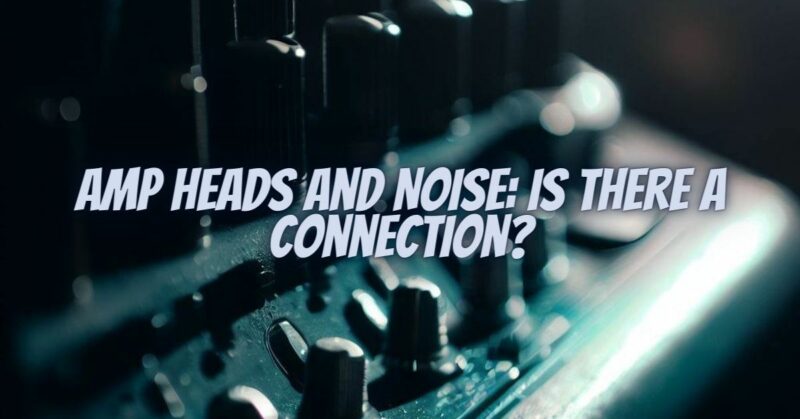As any guitarist will attest, the quest for the perfect tone is a journey filled with both joy and frustration. One of the most exasperating challenges that guitarists often face is dealing with unwanted noise in their amplifier setups. This noise can manifest as hiss, hum, buzz, or even mysterious clicks and pops. In this comprehensive article, we’ll explore the relationship between amp heads and noise, investigating the various factors that can contribute to these sonic gremlins and how to address them effectively.
Understanding the Basics
Before delving into the connection between amp heads and noise, it’s essential to understand the nature of the problem. Noise in guitar amplifiers can originate from various sources, and it’s not always directly related to the amp head itself. Here are some common sources of noise:
- Electronic Interference: This type of noise often stems from electromagnetic interference (EMI) or radio-frequency interference (RFI). It can be caused by nearby electronic devices, lighting fixtures, or even poor-quality cables.
- Ground Loops: Ground loops occur when there are multiple paths to ground in an audio signal’s path. This can create a hum or buzzing sound in your amplifier.
- Tube Amplifiers: Tube amp heads can introduce hiss and hum due to the nature of vacuum tubes. Tubes can pick up interference, and their components can degrade over time, leading to noise issues.
- Pedalboard and Effects: Noise can also be introduced by effects pedals and the order in which they are connected in your signal chain.
- Cable Quality: Low-quality or damaged cables can introduce noise into your signal path.
Amp Heads and Noise: The Connection
While amp heads themselves are not inherently noisy, they can contribute to or amplify existing noise issues in several ways:
- Tube Amps and Hiss: Tube amplifiers are known for their warm and organic tone but can produce a certain amount of hiss, especially when driven hard. This hiss is often considered part of the amp’s character. However, excessive hiss may indicate tube issues or a problem with the amp’s components.
- Grounding Issues: Improper grounding can lead to noise problems in any amplifier, including amp heads. Ground loops, as mentioned earlier, can introduce hum or buzz into the signal.
- Effects Loop Noise: If your amp head has an effects loop, the cables and pedals connected to it can introduce noise. Placing certain pedals in the loop, using low-quality cables, or improper pedal placement can exacerbate noise problems.
- Amp Head Maintenance: Neglected maintenance of your amp head, particularly if it’s a tube amp, can lead to noise issues. Dirty or faulty tubes, loose connections, and worn components can all contribute to unwanted noise.
Addressing Amp Head-Related Noise
Now that we’ve established the potential connections between amp heads and noise, let’s discuss strategies for addressing and minimizing these issues:
- Use Quality Cables: Invest in high-quality cables and regularly inspect them for damage. Good cables can help reduce noise caused by interference and signal loss.
- Pedalboard Management: Pay attention to your pedalboard layout and order. Experiment with different pedal placements to minimize noise. Consider using a noise gate pedal to suppress unwanted noise between notes.
- Proper Grounding: Ensure that your amp head and all connected equipment are properly grounded. Using a power conditioner or isolation transformer can help reduce ground loop issues.
- Tube Maintenance: If you have a tube amplifier, regularly check and replace tubes as needed. Consult your amp’s manual for guidance on proper maintenance.
- Shielding: Shielding the inside of your amp’s chassis with copper tape or other materials can help reduce interference from outside sources.
- Consult a Technician: If you’re experiencing persistent noise issues, it’s advisable to consult a professional amp technician. They can diagnose and address any underlying problems with your amp head.
While amp heads themselves are not inherently noisy, they can be part of the noise equation in a guitar amplifier setup. Understanding the potential sources of noise and taking proactive steps to address them is crucial for achieving the best possible tone and performance. Regular maintenance, proper grounding, and investing in high-quality gear can all contribute to a quieter and more enjoyable playing experience. Remember that noise is a part of the guitarist’s journey, but with the right knowledge and care, you can keep it at bay and let your music shine through with clarity and power.


